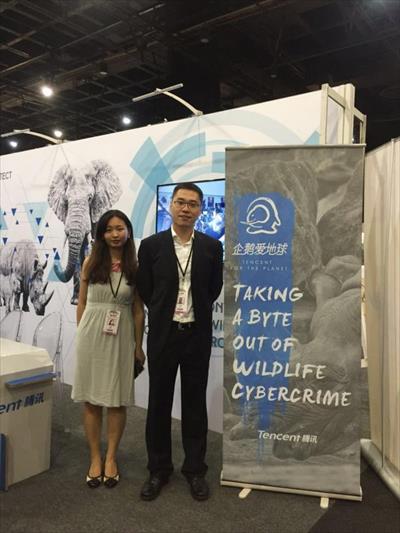|
||||||||||
| Home Nation World Business Opinion Lifestyle ChinAfrica Multimedia Columnists Documents Special Reports |
|
||||||||||
| Home Nation World Business Opinion Lifestyle ChinAfrica Multimedia Columnists Documents Special Reports |
| China |
| Wildlife Cybercrime Priority |
| Curbing online wildlife crime takes center stage at CITES COP17 in Johannesburg |
| By Lu Anqi | ChinAfrica Web Exclusive ·2016-09-30 |

Known as "Taking a Byte Out of Wildlife Cybercrime," The meeting brought together giant online tech companies Tencent of China and eBay, with International Fund for Animal Welfare (IFAW), wildlife trade monitoring networking TRAFFIC, the Public Prosecution Office of Kenya and the Chinese CITES Management Authority, to showcase their strategies for tackling wildlife cybercrime.
"Online wildlife crime poses a serious threat to endangered animals including elephants, rhinoceros, reptiles and birds," said Tania McCrea-Steele, leader of IFAW's Global Wildlife Cybercrime Project. "It is essential that companies, governments and NGOs come together to fight this growing hazard."

"Taking a Byte Out of Wildlife Cybercrime" brings big business, government agencies and the NGO community together to tackle online wildlife crimes
"We have a zero-tolerance policy for illegal wildlife trade conducted through any of our products or services and are dedicated to using our expertise to create innovative ways of protecting endangered species via the internet," said Band Yang, Director of Information Security Executive Committee, Tencent, and the event co-host.
"We have also been working with other global technology leaders to set the standards for fighting illegal wildlife related trade, as well as sharing experience with these like-minded companies," Yang said.
In May 2015, Tencent, owner of social media platform Wechat and instant messaging service QQ, launched the program "Tencent for the Planet" jointly with the Nature Conservancy and IFAW. This initiative commits to educate users of its platforms about species conservation and stigmatize illegal wildlife trade, remove infringing postings on WeChat and QQ, and facilitate enforcement.
"eBay has more than a decade of experience fighting illegal wildlife trading" said Wolfgang Weber, head of Global Regulation at eBay.
"In our experience," he said, "these partnerships are the most powerful and effective means to achieve tangible and sustainable results. This is why we welcome and support this important initiative."
eBay hosted the first round table targeting the illicit trade of ivory together with IFAW in 2006.
In January 2009 eBay took the important step of banning the sale of all ivory items on its platforms worldwide and has been working to strengthen enforcement and oversight since.
"Given the global reach of the internet, industry-wide exchanges and a policy framework on online illegal wildlife trade are needed to address the issue comprehensively and effectively," said Xu Ling, TRAFFIC's Senior Manager. "This could help to simplify and standardize efforts to monitor the internet."
Online wildlife trade has become a vast and difficult to monitor industry. IFAW's 2014 report Wanted – Dead or Alive: Exposing Online Wildlife Trade found over 30,000 animals or their parts and products sold across 280 online marketplaces, in just 16 countries in a six week period. Investigators also found 9,482 advertisements for endangered animals and wildlife products, estimated to be worth at least $10-million.
| About Us | Contact Us | Advertise with Us | Subscribe |
| Copyright Beijing Review All rights reserved 京ICP备08005356号-5 京公网安备110102005860号 |